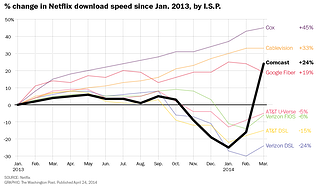Today in our dev meeting ISP cost came up (as a side topic) and led to net neutrality. Our senior dev brought up how, contrary to what I hear most often from techies etc., net neutrality does actually stifle solutions to common ISP issues.
The example that's throwing me into question is the Netflix Open Connect project. Netflix gives ISP's free boxes that basically contain most of Netflix so that the ISP doesn't have to handle that traffic the last mile and any previous choke points. My colleagues angle was that net neutrality, by banning Netflix paying the ISP any money, means that Netflix can't (or doesn't have to if the ISP opts to take the box anyway) pay for the electricity or whatever for the ISP to have that box sitting there, THUS stifling wider adoption of what I would consider to be a fairly good idea to get me my dang 4k Netflix.
Couldn't find much on it but here's an article explaining the box: http://gizmodo.com/this-box-can-hold-an-entire-netflix-1592590450
Here's an article that basically says net neutrality has become a way for Netflix not to have to help pay for things, for instance if an ISP takes the box, they can't ask Netflix to pay for electricity or whatever: https://www.forbes.com/sites/larrydownes/2014/11/25/how-netflix-poisoned-the-net-neutrality-debate/#435094e41c4d
I'm not sure what I think of net neutrality now. Obviously the articles are old, sorry if this has been gone over already, but I don't recall anyone ever explaining bad that can come of net neutrality. Thoughts? Shouldn't it be OK for an ISP and Netflix or whoever to agree to copay for a last mile content box?

